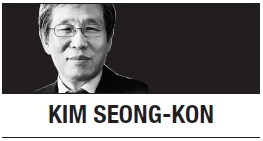 Recently I read two books that deal with the future of Korea. One was “For Whom This Nation Exists” by Kim Hyong-o, a former National Assemblyman and house speaker. The other was “Korea 4.0 Now” by Kang Tae-jin, a professor of textile engineering and former dean at Seoul National University. While I was reading the two books, I could not but help nod frequently. Both books were well-argued, highly persuasive, penetrating and illuminating. Above all, they were thought-provoking and eye-opening.
Recently I read two books that deal with the future of Korea. One was “For Whom This Nation Exists” by Kim Hyong-o, a former National Assemblyman and house speaker. The other was “Korea 4.0 Now” by Kang Tae-jin, a professor of textile engineering and former dean at Seoul National University. While I was reading the two books, I could not but help nod frequently. Both books were well-argued, highly persuasive, penetrating and illuminating. Above all, they were thought-provoking and eye-opening. “For Whom This Nation Exists” argues that our political leaders have seriously lacked magnanimous leadership, that is, the capacity of embracing others, including their political opponents. Instead of embracing the differences, our leaders have almost always antagonized and turned their backs on those who do not belong to their faction, no matter how able and competent they are. Before appointing someone at a government post, our narrow-minded leaders have always asked, “Is he one of us?” or “Was he in our election camp?”
Kim also argues that our social or political leaders have also lacked noblesse oblige, that is, the spirit of sacrifice, responsibility and decency that comes with privelege. In the eyes of the people, they just savor power bestowed upon them. But a true leader is one who is ready to sacrifice himself for people in an emergency. Unfortunately, our leaders have always disappointed us. When the Korean War broke out, our first president fled to the south, destroying the Han River Bridge as he left, so people could not escape from Seoul. The captain of the ill-fated Sewol abandoned his ship, leaving passengers to drown. When there was an earthquake, a school principal, instead of protecting or rescuing his students, reportedly escaped alone.
“For Whom This Nation Exists” also laments our leaders’ clumsiness and incompetence in times of crisis. For example, when the Sewol sank or when the Middle East respiratory syndrome epidemic spread, our leaders exhibited total incompetence. How can we trust and respect such inept leaders? Furthermore, no one assumes responsibility in Korean society when something happens.
Kim also urges our political leaders to tear down the wall of collective selfishness and break the shell of factional antagonism. Indeed, our society urgently needs integration and reconciliation. After reading Kim’s insightful book, I hope that one day we all could sit at the table of reconciliation, singing together in unison and dancing joyously to peaceful music.
The other book, “Korea 4.0 Now,” emphasizes the importance of convergence to integrate different academic disciplines such as engineering, medicine, education and the humanities. In the book, Kang encourages not only interdisciplinary, but also multidisciplinary and transdisciplinary approaches in academia that would enable us to have more sophisticated, comparative perspectives. The book calls for modern-day Renaissance men in Korean society.
Kang also highlights that in order to accomplish true convergence and consilience, we should be creative. According to the book, creativity can be fostered by educational reform. Kang boldly argues that the binary evaluation system that forces students to choose the one and only right answer out of five possible answers should be abolished because it blocks diverse possibilities of creative thought. Kang says that so many revolutionary scientific discoveries inadvertently stem from random questions or what we perceive as wrong answers. In scientific terms, he writes, it is called “serendipity.”
In “Korea 4.0 Now,” Kang contends that our future will be shaped by our excellence not only through creativity, but also artificial intelligence, nanotechnology, bioengineering, big data and other technologies that belong to the “fourth industrial revolution.” He urges that we should be prepared for the upcoming social change.
In his book, Kang brings up an incident. At a G-20 summit meeting in 2010, Barack Obama repeatedly gave Korean reporters a chance to ask a question. Regrettably, no Korean reporters spoke at the time, whereas a Chinese reporter tried to ask questions several times. Kang blamed the Korean education that does not encourage people to ask questions. In my opinion, they could also have been silent because they were unsure of their English proficiency. Experts maintain that our English education has totally failed, because its main concern is not how to express yourself, but how to choose the grammatically right answer at the college entrance exam. If so, educational reform is imperative in Korea.
After reading the two books, I pondered on the future of Korea. The two authors urge us to change. For example, we should put an end to populism, which is likely to make our nation bankrupt eventually, if pushed to the extreme. We should root out chronic factional brawls and unite. We should also try to change the future, not the past. In the movie “Dragon Blade,” Jackie Chan narrates, “While cowards cling to the past, courageous men change the future.” We, too, should become brave men who can change our future. Only then, will Korea’s future be bright.
By Kim Seong-kon
Kim Seong-kon is a professor emeritus of English at Seoul National University and president of the Literature Translation Institute of Korea. He can be reached at sukim@snu.ac.kr. -- Ed.







![[KH Explains] Hyundai's full hybrid edge to pay off amid slow transition to pure EVs](http://res.heraldm.com/phpwas/restmb_idxmake.php?idx=644&simg=/content/image/2024/04/18/20240418050645_0.jpg&u=20240419100350)






![[From the Scene] Monks, Buddhists hail return of remains of Buddhas](http://res.heraldm.com/phpwas/restmb_idxmake.php?idx=652&simg=/content/image/2024/04/19/20240419050617_0.jpg&u=20240419175937)

![[KH Explains] Hyundai's full hybrid edge to pay off amid slow transition to pure EVs](http://res.heraldm.com/phpwas/restmb_idxmake.php?idx=652&simg=/content/image/2024/04/18/20240418050645_0.jpg&u=20240419100350)

![[Today’s K-pop] Illit drops debut single remix](http://res.heraldm.com/phpwas/restmb_idxmake.php?idx=642&simg=/content/image/2024/04/19/20240419050612_0.jpg&u=)